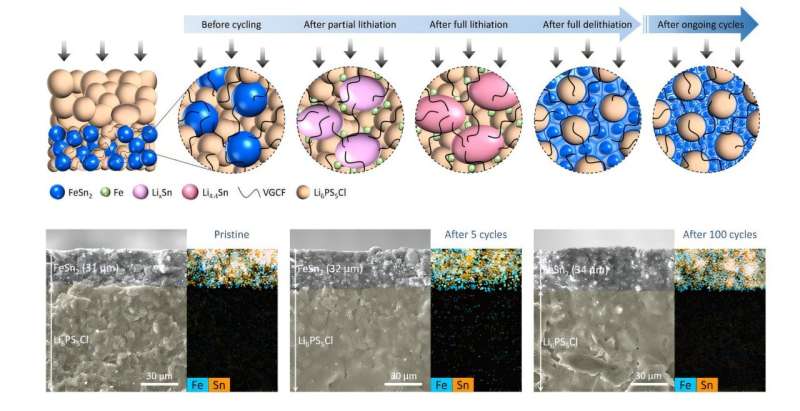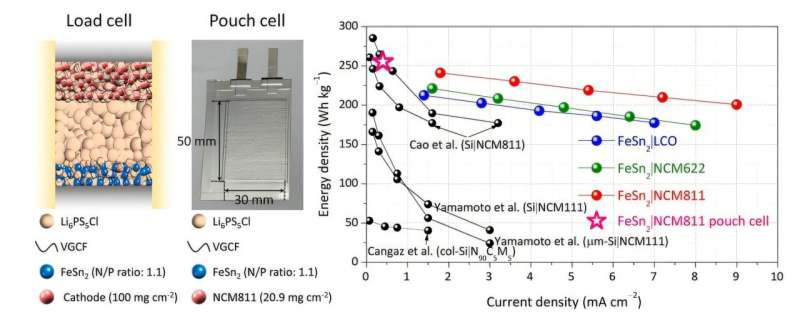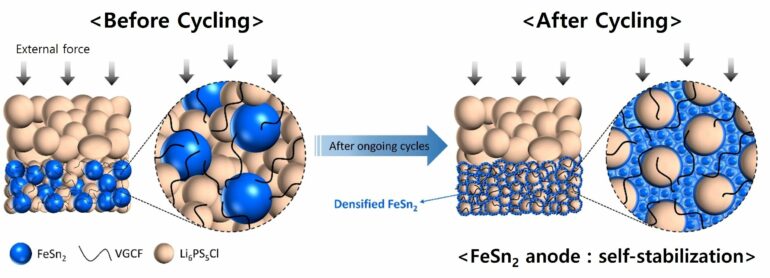A study published in the journal Joule introduces new anode materials for solid-state batteries (SSBs). The research was conducted by the Korea Electrotechnology Research Institute (KERI) in collaboration with Kumoh National Institute of Technology and Inha University.
SSBs have replaced the combustible liquid electrolyte that transfers ions between the anode and cathode with a solid electrolyte, significantly reducing the risk of fire or explosion. However, SSBs, due to their “solid” nature, require much advanced technology, such as ensuring electro-chemo-mechanical stability during the charging and discharging processes.
In particular, since the anode has a significant impact on the charging rate and lifespan of the battery, the choice of material is extremely important. Currently, Li-metal is the most extensively researched anode material for SSBs. However, in the case of Li-metal, repeated charging and discharging lead to dendrite growth, where lithium grows in tree-like structures on the surface. This phenomenon can result in internal short circuits, threatening the battery’s lifespan and stability.
Besides Li-metal, silicon anode materials are also available; however, they face several challenges, including low electronic and ionic conductivity, as well as cracks caused by volumetric expansion.
The anode materials proposed by KERI and the university team this time are tin(Sn)-based alloy materials, specifically FeSn2. The research team identified through detailed mechanical property analysis that FeSn2 exhibits a characteristic of particle size reduction due to recombination reactions during repeated charging and discharging.
This confirms that in SSBs, the contact between the internal solid particles is maintained for a long period of time, resulting in a dense and uniform electrode. Even in environments with external stimuli, FeSn2 exhibits high elasticity and deformation energy, ensuring good electrochemical stability without cracking.

Schematic diagram and scanning electron microscope (SEM) images illustrating the reaction behavior of FeSn2 anode materials during the cycling process of SSBs. © Korea Electrotechnology Research Institute
The research team developed a test SSB full cell to validate the technology, utilizing a FeSn2 anode, NCM622 (nickel 6, cobalt 2, manganese 2 combination) cathode, and sulfide solid electrolytes (Li6PS5CI). As a result, an areal capacity of 15.54 mAh/cm2 was achieved, which is five times higher than that of conventional lithium-ion batteries.
Additionally, high-rate charging and discharging were conducted for over 1,000 cycles under three-minute (20C current density) and six-minute (10C current density) conditions, achieving a capacity retention of over 70–80%.
In addition, the research team evaluated the performance of the FeSn2 anode in SSBs by applying it to a prototype pouch cell format. A high energy density of over 255 Wh/kg was recorded, demonstrating its commercial potential.

Electrochemical performance and energy density of SSBs utilizing FeSn2 anode materials. © Korea Electrotechnology Research Institute
Yoon-Cheol Ha, Director of the Next Generation Battery Research Center at KERI, stated, “Our achievement is significant as it breaks away from the conventional focus on Li-metal and silicon in the research of anode materials for SSBs, demonstrating the great potential of tin-based alloy anode materials.”
Additionally, Professor Cheol-Min Park of Kumoh National Institute of Technology expressed his ambition, stating, “Through the development of stable high-performance anode materials that surpass existing limitations, we aim to contribute to the commercialization of non-flammable SSBs.”
More information:
Young-Han Lee et al, Empowering all-solid-state Li-ion batteries with self-stabilizing Sn-based anodes, Joule (2024). DOI: 10.1016/j.joule.2024.08.011
Provided by
National Research Council of Science and Technology
Citation:
Researchers propose Sn-based materials as superior anodes for all-solid-state Li-ion batteries (2024, October 23)



